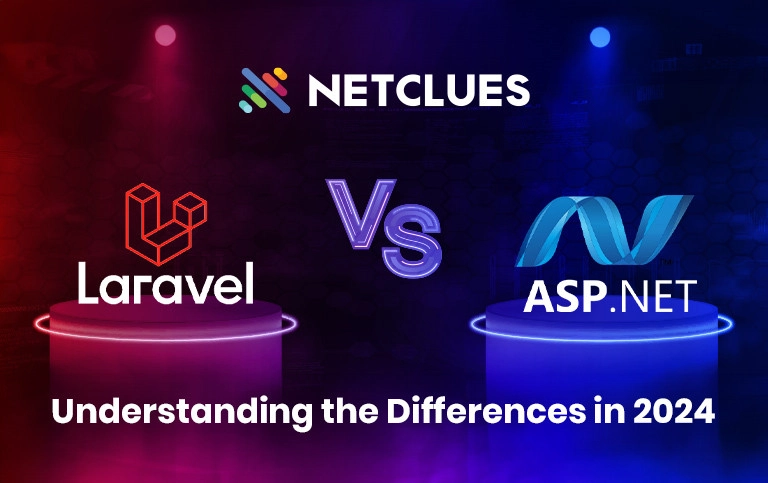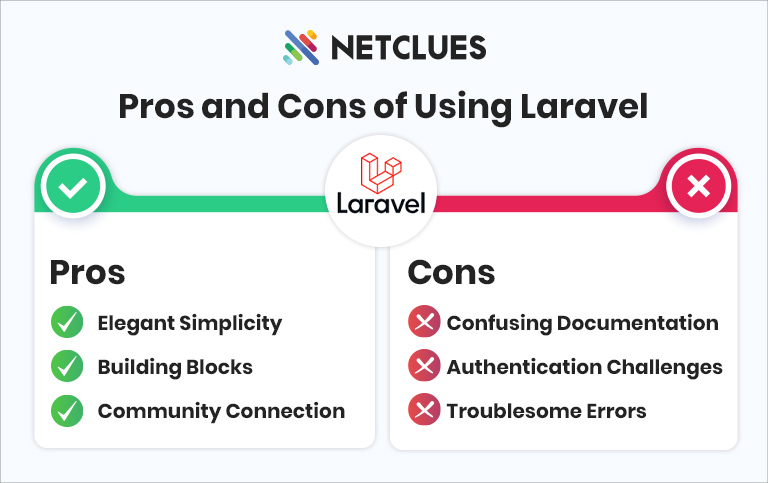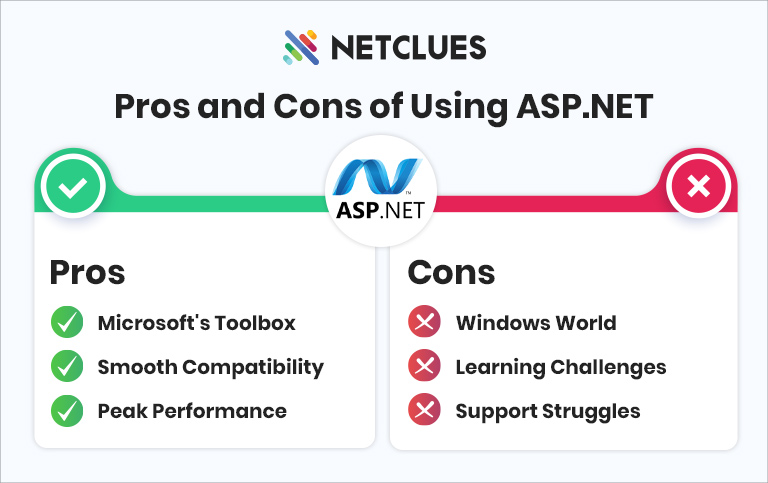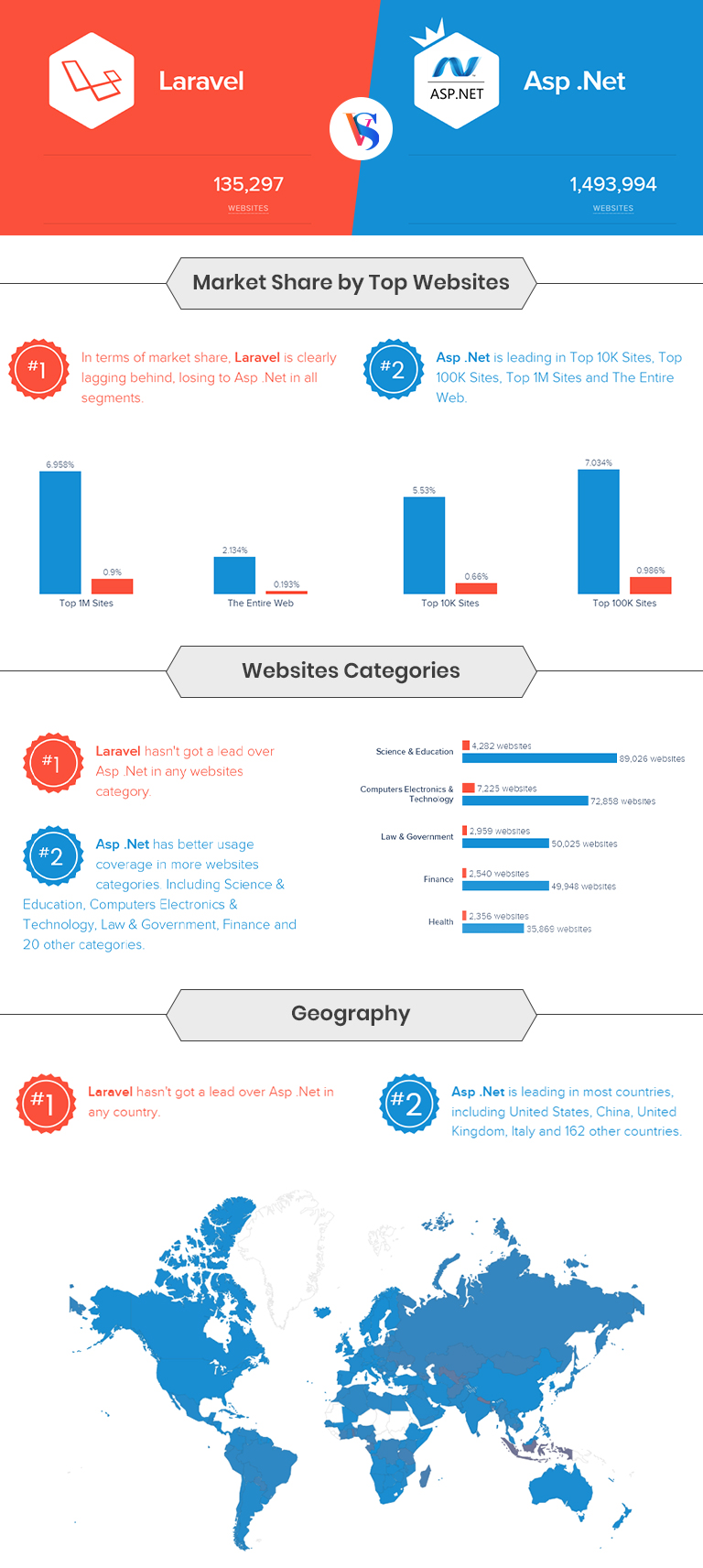
Today, we all are familiar with the power of digitalization. It does not require any introduction or explanation since we also cross-check our doubts only on the web. Elevate your business with digital initiatives and understand the roles of various web development technologies. Nowadays, it's not just about what a website can do; it's about how well-designed it is, how user-friendly it is, how fast it responds, and how effectively it gets the job done.
While this competition is going on, the technical market of web development is also racing with various development languages, where Laravel and ASP.NET are giving a good fight to others. You can hire back end developers who are good at Laravel and ASP.NET for your needs, but before that, look at the specifications below to be clear on which language is used and how.
In this blog, we will make it clear and simpler for you. Let’s ride through the worlds of Laravel and ASP.NET as we explore these web development frameworks and help you better understand them in 2024.
What is Laravel?
Laravel is a popular web development framework built on PHP. It carries many tools and libraries for developers to streamline the web application process. This technology follows the MVC (Model-View-Controller) architectural pattern, making separating the application's logic from its presentation easier.
With Laravel, developers can efficiently create dynamic and interactive websites. Features like routing, authentication, database management, and templating make it more compatible. Laravel has a vibrant community and extensive documentation, making it an excellent choice for beginners and experienced developers.
Pros and Cons of Using Laravel

Now that you know what Laravel is, it’s time to check out its benefits and challenges in your web development process.
Advantages:
- Elegant Simplicity: Laravel impresses with its smooth, easy-to-understand language and organization, turning difficult tasks into enjoyable experiences, like walking through a beautiful garden.
- Building Blocks: Thanks to Laravel's organized structure, developers can create complex web applications with the skill of a seasoned craftsman, fitting together different parts like a puzzle to make something amazing.
- Community Connection: Joining the Laravel community is like entering a lively marketplace where everyone is friendly and willing to work together. It's a place full of opportunities to collaborate and make friends.
Disadvantages:
- Confusing Documentation: Figuring out how to use Laravel's documentation can be like trying to find buried treasure without a map, leaving developers feeling lost and scratching their heads.
- Authentication Challenges: Although Laravel provides many authentication options, setting up the right one can be like trying to untangle a mess of spaghetti, with unexpected problems popping up along the way.
- Troublesome Errors: Fixing mistakes in Laravel can feel like going on a crazy adventure, with unexpected twists and turns that even experienced developers find confusing and disorienting.
But fear not; having Laravel as your ally means every obstacle is a chance for excitement and learning. So get ready for a ride through the imaginative world of web development, where Laravel stands out as a unique and playful member of the coding community. In case of any further clarity, having a professional Laravel development company for consultation by your side has always been a good idea.
What is ASP.NET?
ASP.NET is a Microsoft-created web development framework that allows developers to build dynamic web applications and services. This technology allows developers to create websites via various programming languages like C#, Visual Basic, and F#.
It offers many tools and libraries to streamline the development process and ensures web application scalability, security, and performance. Additionally, ASP.NET is compatible with cross-platform collaboration. It allows developers to build and deploy applications on Windows, macOS, Linux, and Docker platforms.
Picture a place where creating websites isn't just work but a form of artistic expression. In this world, every piece of code is like a stroke of paint on a canvas. ASP.NET turns this idea into something real, giving developers a space to let their creativity run wild and turn their visions into actual websites.
Pros and Cons of Using ASP.NET

Now, let's take a journey through the world of ASP.NET, where we'll explore its advantages and disadvantages, like characters in a captivating story, each playing their part in the grand narrative.
Advantages:
- Microsoft's Toolbox: ASP.NET gives developers access to a range of top-notch tools and technologies from Microsoft, like a magician unveiling the universe's wonders with a flick of their wand.
- Smooth Compatibility: ASP.NET effortlessly blends with other Microsoft products and services, creating a seamless connection that works smoothly in the development process.
- Peak Performance: By tapping into .NET's capabilities, ASP.NET offers exceptional performance and scalability, propelling your web applications to new heights of success with ease and elegance.
Disadvantages:
- Windows World: ASP.NET's preference for Windows servers may seem like entering a realm of unpredictable costs, where every action involves financial consideration.
- Learning Challenges: Understanding ASP.NET can be like traversing a complex maze, akin to navigating through a series of challenging obstacles in coding.
- Support Struggles: Despite ASP.NET's robust support resources, deciphering Microsoft's documentation may feel like solving a puzzle within a puzzle, wrapped in layers of complexity.
But fear not; With ASP.NET by your side, every obstacle is a chance to learn and improve. So, gear up and move on an exciting journey through the world of web development. In this field, ASP.NET stands out as the polished and sophisticated member of the coding family. If you are not from a technical background and suffering from understanding issues, there are plenty of good dot net development services providers you can consult anytime.
ASP.NET vs. Laravel
When to Use Laravel and When to Use ASP.NET?
Statistical Comparison: ASP.NET vs. Laravel
Statistics By: similartech.com

Ultimately, picking between Laravel and ASP.NET is similar to choosing between a relaxing walk in a beautiful park or a fast-paced run through busy city streets.
Conclusion
Choosing the right IT consulting for your needs is overwhelming. Whether you're attracted to the capabilities of Laravel or the sophisticated performance assurance of ASP.NET, Team Netclues is there for you, with skilled developers to fulfill your requirements. Remember, web development is not just about posting your offerings on the web; it's about leveraging the potential of digital sales and embracing the opportunities.
Are you ready to take the ride? Connect with a Netclues consultant today and unlock your free consultation to turn your vision into reality. Together, we'll unlock the full potential of the digital world and create something truly extraordinary.





